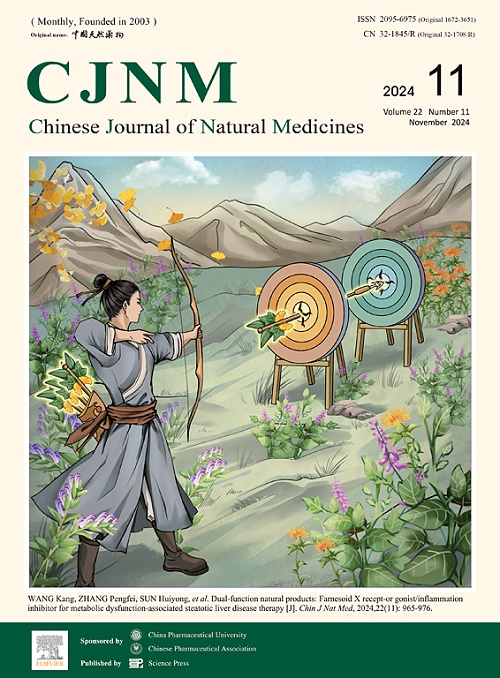Discovery and characterization of naturally occurring covalent inhibitors of SARS-CoV-2 Mpro from the antiviral herb Ephedra
IF 4
2区 医学
Q1 INTEGRATIVE & COMPLEMENTARY MEDICINE
引用次数: 0
Abstract
The Chinese herb Ephedra (also known as Mahuang) has been extensively utilized for the prevention and treatment of coronavirus-induced diseases, including coronavirus disease 2019 (COVID-19). However, the specific anti-SARS-CoV-2 compounds and mechanisms have not been fully elucidated. The main protease (Mpro) of SARS-CoV-2 is a highly conserved enzyme responsible for proteolytic processing during the viral life cycle, making it a critical target for the development of antiviral therapies. This study aimed to identify naturally occurring covalent inhibitors of SARS-CoV-2 Mpro from Ephedra and to investigate their covalent binding sites. The results demonstrated that the non-alkaloid fraction of Ephedra (ENA) exhibited a potent inhibitory effect against the SARS-CoV-2 Mpro effect, whereas the alkaloid fraction did not. Subsequently, the chemical constituents in ENA were identified, and the major constituents’ anti-SARS-CoV-2 Mpro effects were evaluated. Among the tested constituents, herbacetin (HE) and gallic acid (GA) were found to inhibit SARS-CoV-2 Mpro in a time- and dose-dependent manner. Their combination displayed a significant synergistic effect on this key enzyme. Additionally, various techniques, including inhibition kinetic assays, chemoproteomic methods, and molecular dynamics simulations, were employed to further elucidate the synergistic anti-Mpro mechanisms of the combination of HE and GA. Overall, this study deciphers the naturally occurring covalent inhibitors of SARS-CoV-2 Mpro from Ephedra and characterizes their synergistic anti-Mpro synergistic effect, providing robust evidence to support the anti-coronavirus efficacy of Ephedra.
从抗病毒草药麻黄中发现天然的 SARS-CoV-2 Mpro 共价抑制剂并确定其特性
中草药麻黄(又名麻黄)已被广泛用于预防和治疗冠状病毒引起的疾病,包括冠状病毒病 2019(COVID-19)。然而,具体的抗SARS-CoV-2化合物和机制尚未完全阐明。SARS-CoV-2 的主要蛋白酶(Mpro)是一种高度保守的酶,负责病毒生命周期中的蛋白水解处理,因此是开发抗病毒疗法的关键靶点。本研究旨在从麻黄中鉴定天然存在的 SARS-CoV-2 Mpro 共价抑制剂,并研究其共价结合位点。结果表明,麻黄的非生物碱部分(ENA)对 SARS-CoV-2 Mpro 的作用有很强的抑制作用,而生物碱部分则没有。随后,对ENA中的化学成分进行了鉴定,并评估了主要成分的抗SARS-CoV-2 Mpro作用。在测试的成分中,发现香草素(HE)和没食子酸(GA)对 SARS-CoV-2 Mpro 的抑制作用具有时间和剂量依赖性。它们的组合对这种关键酶有明显的协同作用。此外,还采用了多种技术,包括抑制动力学测定、化学蛋白组学方法和分子动力学模拟,进一步阐明了 HE 和 GA 组合的协同抗 Mpro 机制。总之,本研究解读了麻黄中天然存在的SARS-CoV-2 Mpro共价抑制剂,并描述了其协同抗Mpro的增效作用,为麻黄的抗冠状病毒功效提供了有力的证据支持。
本文章由计算机程序翻译,如有差异,请以英文原文为准。
求助全文
约1分钟内获得全文
求助全文
来源期刊

Chinese Journal of Natural Medicines
INTEGRATIVE & COMPLEMENTARY MEDICINE-PHARMACOLOGY & PHARMACY
CiteScore
7.50
自引率
4.30%
发文量
2235
期刊介绍:
The Chinese Journal of Natural Medicines (CJNM), founded and sponsored in May 2003 by China Pharmaceutical University and the Chinese Pharmaceutical Association, is devoted to communication among pharmaceutical and medical scientists interested in the advancement of Traditional Chinese Medicines (TCM). CJNM publishes articles relating to a broad spectrum of bioactive natural products, leading compounds and medicines derived from Traditional Chinese Medicines (TCM).
Topics covered by the journal are: Resources of Traditional Chinese Medicines; Interaction and complexity of prescription; Natural Products Chemistry (including structure modification, semi-and total synthesis, bio-transformation); Pharmacology of natural products and prescription (including pharmacokinetics and toxicology); Pharmaceutics and Analytical Methods of natural products.
 求助内容:
求助内容: 应助结果提醒方式:
应助结果提醒方式:


